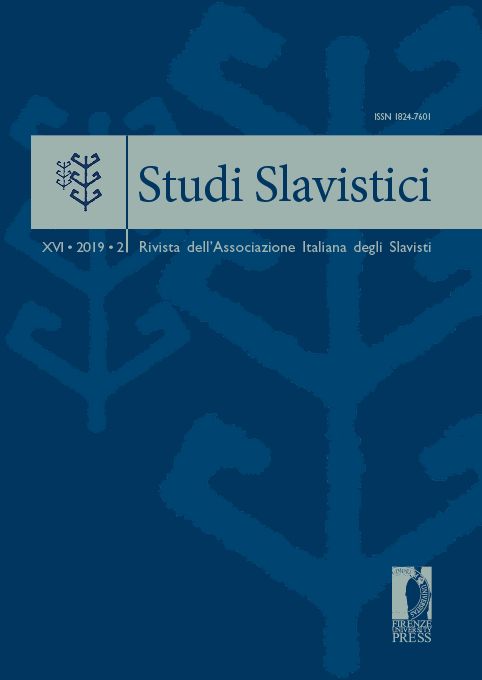Published 2020-01-20
Keywords
- Revolution of Conscience,
- Russian Revolution,
- Idyll,
- “Power of Idea”,
- Competition Between Vocations
Abstract
Paying tribute to the historical collection of essays Landmarks (1909), I interpret the findings of five articles published in the previous issue of “Studi Slavistici” as contributions to our knowledge of how the Russian intellectual elite conceptualised and managed their intellectual, social and physical participation in and survival vis-à-vis the “Russian revolution”. I view the “Russian revolution” as a double, literary-political, or, rather, triple, mental-political-social, phenomenon which came about from the interaction of two Messianisms, socialist and national, suggesting a periodization which duly accounts for its literary/mental aspect: 1848-1930. Understanding “revolution of conscience” as a loss/overcoming of one’s naïve attitude to his or her intellectual-and-social habitus, I compare individual strategies of such ‘losers’ / ‘overcomers’ (Lev Šestov; Evgenij Zamjatin; Michail Prišvin; Vasilij Rozanov; Aleksandr Blok; Roman Jakobson; Vladimir Majakovskij; Vasilij Žukovskij) in coping with the social and political aspects of revolution. I claim that their experience is interpretable against the framework of a ‘competition between professions’ but for now I am able to map the situation in quite general terms only: as one of litterateurs being defeated by politicians whom I designate as ‘technologists of crowd’. In order to make the articles’ findings interoperable, and also compatible with my intentions, I reshape those findings from a literary-sociological perspective. I introduce, besides, two more historical figures: Aleksandr Herzen and Aleksandr Bogdanov, suggesting to view the experience of Herzen and Žukovskij as prototypical and the one of Bogdanov as an epitome of the kinds of experiences Russian intellectuals had within the historical cycle of the “Russian revolution”.


